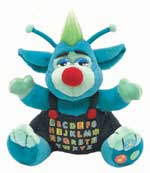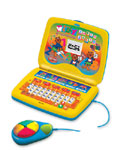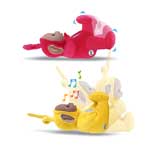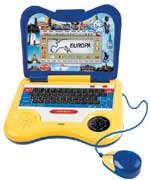|
|||
| Introduction | |||
| Childhood games and toys | |||
| NEUROBIOLOGICAL DEVELOPMENT AND EDUCATIONAL PROGRAMS When educators say that our mission is to develop the child’s personality, abilities and mental and physical capacities to their maximum potential, we are talking about the global development of a child in all its aspects. So we will have to direct our actions towards the development of what we know as multiple intelligences. This is important because, as all of us know, the appropriate stimulation from the earliest stages is the main condition to guarantee the proliferation of synaptic connections, neuronal links and, as a consequence, intellectual development. We know, thanks to the research conducted by the Carnegie Foundation in the USA, that the number of neurons a child has in his first birthday is a third less than what he had when he was born, and when that child is two years old he has left only half of the original amount. This dramatic fact demonstrates the need to properly stimulate the child from the very moment he is born and, even during his intrauterine life. The hereditary and genetic components determine biophysiological predispositions in the child, internal potentials linked to the condition of his nervous system, the quality of his analyzers, the particularities of his higher nervous activity, the bone & muscle tone and strength, the internal vegetative activity, the metabolic exchange with the environment, amongst many factors, that constitute elements that foster the formation of specific abilities or physical and psychological characteristics. These features need the setting and the timely stimulation to become apparent and to allow these predispositions to become skills that enable their development in all areas of human behavior. Children’s interaction with their parents is what brings about psychological development. This system of influences has been created in a conscious and organized way and is expressed through educational programs that take into account all the particularities of the children’s nervous system (specially the higher nervous activities) and the internal conditions of each child to structure such system to achieve their aims.
The educational program tries to develop all the physical and psychological potentialities of the child; that is, it has to achieve the formation and development of all the intelligences. To systematize it, it is advisable to take Gardner’s model, as far as these intelligences are concerned. According to him there are seven different types of intelligence (some authors affirm that there are more than 70):
A well-conceived educational program must encompass several contents that serve as stimulating experiences for each one of the different intelligences so that they can be expressed as much as possible to the level each child can achieve. From this point of view a good early childhood educational program has to favor the development of the linguistic intelligence. This is done using contents related with the formation and improvement of the mother tongue and with those promoted by narration, verbal games, listening to tapes, learning poetry and tales, telling experiences, analyzing sounds and words, expressing different ideas orally, assessing the language used by peers, making rhymes and riddles, watching puppet shows, performing plays and role-plays, in short, all kind of activities that promote communication, verbal exchanges and speaking and listening about different subjects. Logical and mathematical intelligence is stimulated through contents related to quantitative relations, mathematical elemental notions, problem solving, formation of general intellectual abilities such as identification, classification, comparison, association, serialization, carrying out easy experiments, mental games, numerical riddles, logical puzzles, among other activities.
To form spatial intelligence the program must include contents that promote the presentation of different facts on images and worksheets, drawings, modeling and construction with blocks of different sizes, the use of labyrinths and puzzles, the visualization of illustrated books, videos and films, color shadings, playing with mosaics of different shapes and colors, dominoes of geometric shapes, animals and colors, manipulation and knowledge of the world of objects and its relationships, practice of spatial relationships (beside, in front of, under, left, right, near, far...), trips and excursions to natural areas and art museums, etc. The contents to develop the physical and kinesthetic intelligence have to do with making crafts, different activities that promote movements like jumping, running, climbing, creeping, holding, that are expressed in physical education and in independent motor activity, and also more precise hand movements such as modeling, drawing, constructing, dancing and practicing corporal expressions, imitation games, games using equipment in outdoor areas: swings, carrousels, ladders, gymnastic equipment, climbing ropes, obstacle courses, and all those things that promote body sensations, physical balance and manual learning.
Musical intelligence is promoted through contents that stimulate the formation of diverse musical abilities, such as learning poetry and stories, songs, rhythm, pulse and accent of musical sounds, listening to music from different sources: radio, tape recorder, cassettes and CD’s, playing some easy musical instruments, dancing, expressing movements according to the music that is being listened to, participating in choirs and bands, defining environmental sounds, amongst other activities. To develop interpersonal intelligence the educational program has to include contents that foster cooperative and group learning, mutual help and solidarity, table games, role plays, preparation of materials for parties and festivals, visiting their community, bringing relevant people to the school to interact with the children, performing plays, doing easy collective tasks, such us picking up the toys, cleaning play areas, taking care of the orchard, helping the staff in the dining room, etc. In spite of the age of the children the program has to include actions to develop intrapersonal intelligence; it can be done by including contents in which the educator has to imprint feelings on the presentations, analyze games and behaviors, favor moments for free and independent activities and for occasional solitary play. It has to offer alternatives to carry out any activity, asking the child how she has reached a result when finishing that activity. Another good thing is to summarize experiences that took place at home or in the school in the previous days, or letting the children explain personal ones. In short, combined actions that lay the ground for a self-introspection process in further stages of development.
These activities have to be incorporated into the group of didactic strategies that enable the educational program to exercise the different intelligences daily, in order to avoid the "over-stimulation" of some of them to the detriment of the rest. This can be done in many different ways: combining the stimulation of some intelligences through pedagogical activities, organizing some conditions that allow children to participate freely and independently in the activity, structuring tasks that favor all the types of intelligence. Besides, these programs have to promote contents that promote the formation of ethic rules and values, patterns of socialization and ways of behaving, habit formation, moral feelings, inner pleasure in the presence of beautiful natural and social manifestations and all the behavior and experiences related to children’s affective-motivational sphere. All these things are going to influence emotional intelligence and they are going to impregnate each one of the other intelligences with an affective component that will lead to a better development and formation of these intelligences, starting from the criteria about the narrow link between affective and cognitive factors in the formation of psychological development. This link between emotional and intellectual components in the formation and development of the personality, in which each cognitive act has an affective one linked to it an in which each affective sign is made from cognitive elements that have a casual relationship and interdependence, is nowadays the newest focus of psychological development. Thus it has to impregnate any educational action that is lead to the formation of all those psychological processes and qualities. In this way, the didactic strategies of the educational program, conceived from a rational approach to allow the exercise of all the kinds of intelligence, has to take into account the fact that most of the biophysiological and psychological structures of children of this age are in the middle of a maturation process, so any educational action has an impact and meaning more important for the development than in any other moment of their lives, above all in all those functions and qualities related to those structures. This means that learning situations that stimulate the formation of all those features have to be provided in all the possibilities of the development of each one of the intelligences of children. Since the very moment in which one is conscious that each child possesses the different types of intelligences, the educational program has to balance them so that all of them are developed equally. It also has to consider the best moments in which each one of the intelligences can be developed in a proper way. In this way it has to assess their sensitive periods; a deep knowledge of child development is necessary for this, to identify the most opportune moments to exercise the stimulation. This coexistence of intelligences does not involve a similar level of development in each one of them. The program has to make possible different activities and contents of similar dimension and importance for all of them, so that they have the same possibilities to develop. Then, due to the individual differences of each child, some of the intelligences will be stronger than the rest, but the program will try to develop as much as possible all of them, at least up to an appropriate level. Of course, it is impossible that a child develops up to the maximum all her intelligences, but the main aim of the program is to try that they reach a determinate level; this can only be conceived if the program promotes significant learning experiences in all the intelligences. Programs that only stimulate intellectual processes or those that only focus their attention on personal and affective development, without taking into account the cognitive aspects, are just on the other side of this theory. Our aim is to reinforce global educational programs that contemplate all the lines of development, at the same level of complexity and methodological emphasis. So in a program that takes into account global development, the pedagogical activity related to elemental mathematical notions is as important as the one related to music appreciation or the one that concerns physical and motor abilities.
This implies a conceptual and methodological reorganization and restructuring of the contents and activities that currently, as a general rule, are based on a reinforcement of the methodological time dedicated to the intellectual area to the detriment of the artistic, kinesthetic or interpersonal spheres. This is not an easy task because it implies breaking down some schemes that have characterized the pedagogical approach of early education during a long period of time. On the other hand, it cannot be taken to an extreme: the aim is not splitting the time of activity of each development area in equal parts, as if it was a birthday cake, but finding in the bases of the evolutionary development the most appropriate moments to reinforce the different contents; it is known that each kind of intelligence (in a close relationship with their sensorial periods) has its own evolution. It is necessary to know it to organize an appropriate methodological strategy. It is for this reason that it is possible that in some stages of development, some contents related to one or several kinds of intelligences are methodologically dealt with more intensively or frequently. Even in this case, the educational program has to watch over all of them so that they can be exercised frequently by means of organized pedagogical activity or with free and independent activities. A free activity for children is that in which they decide by themselves what to do, how to do it and whom they have to do it with. It has to be provided in a way in which its conditions allow children to exercise all their intelligences, although pedagogical activities are focused only in some of them, because there is a correspondence between them and their sensorial periods or the particular evolution stage.
In this way, a functional and complex system has been created in order to develop all the types of intelligence and in which all of them are related to one another. So when a child carries out a complex intellectual task, as for example, building a pyramid with a big number of pieces, he does not only develop his spatial intelligence but also his motor skills, as he has to properly insert the different pieces. This stimulates his physical and kinesthetic intelligences due to the movements he has to carry out. The child also feels pleasure because he has successfully completed his creation, and this has an impact on his self-esteem that, in its turn, reinforces intrapersonal intelligence and imprints positive feelings toward that activity, working over his emotional intelligence. If finally the child is stimulated to talk about what he did to achieve his aim, how he did it and what elements he used for it, his linguistic intelligence will also be developed. So activities, pedagogical or free ones, can be conceived to promote several intelligences at the same time. In this way, one intelligence acts over another one, and all of them entwine with each other in a complex functional system. In early education, there are different ways to exercise each one of the intelligences. In an activity that tries to promote the musical intelligence there will be children that learn more songs than some of their mates, and, however, those children perhaps will be able to learn faster how to play a simple instrument. The educational program has to take into account this diversification. All the children must have opportunities to learn songs and to learn how to play instruments, although not all of them will be able to achieve it up to the same level, and not all of them will have the same skill in both things. This is deeply related to individual differences, stimulating or negative experiences, life and educational conditions, amongst other things, but the program has to be structured to make these things possible for any child, and the activities must be thought out to reach a possible level of development, according to the individual characteristics of the children. This leads to the relationships between the brain, the different intelligences and the educational programs: the social development situation. The social situation of the development is a particular combination of internal processes of an individual and the outer conditions of the environment for each stage of development. This will condition the dynamics of each stage and the new functions that take place at the end of each one of them. Each stage is characterized by a special combination of life and activity, conditions that act over some particularities of development and the structures that are formed due to the influence of those conditions. As a consequence of this, the psychological development of children requires the understanding of the conditions that have an influence over them and the understanding of the things that have been formed previously in the internal level, through which the influences of these conditions are reflected. More clearly: life and educational conditions by themselves and in a spontaneous way are not able to determine psychological development, so it is necessary to consider the psychological proprieties formed before, that now belong to an internal level, thanks to which the new environmental influences are reflected. This means that the internal level has a very important role in each stage of the development of the child. To understand how the environment has an influence on the formation of the particularities of the children, according to their age, we have to take into account not only the changes that take place in this mean, but also the ones that take place inside the children. Children’s affective relationship (experiences that are an internal product) has one of the most important roles as far as this subject is concerned. The social situation of development has a very important repercussion on educational programs and the formation of the different intelligences, because it shows how each stage has its own particularity that makes it different from the other stages, as well as how in each moment of the development of the children they have a different internal formation of their psychological processes. It also shows us that it is not possible to conceive development without taking into account the dialectical relationship between the internal and the external factors.
Establishing which ones are the particularities of each stage and to structure the external influence according to the internal knowledge formed previously is an indispensable condition to form each one of the intelligences, their relationships and appropriate exercises. This way, it is possible to reach a really scientific focus among the significance of the internal factors of the development leaving from their material substratum, the brain, with the external factors that are materialized in the educational programs. They are led to obtain the maximum achievement of the children’s physical and psychic potentialities; summing up, to the emergence, formation and good development of all their intelligences. Summarizing, and as general conclusions of the previously exposed subject, the following more global statements can be made: 1. The educational programs, to be truly scientific must consider internal, biological, constitutional, genetic, inherited factors, particularly those related to the brain, their structure and operation, and the nervous higher activity that constitute the material substratum of the formation of the processes and psychological qualities and that arise as a reflection of reality. 2. Educational programs constitute the completed expression of the determining external influences that are the conditions for human development, in particular the conditions of life and education where the children’s personality is formed. In this sense the external factors and the surrounding means, constitute the main factors in the emergence of the properties and psychological processes, as an expression of the reflection of the reality by the individual. 3. Between both factors, the internal and the external one, there is a dialectical interrelation; one cannot exist without the other, and both are conditions for the psychological human development. 4. Educational programs must consider the social situation of the development in each stage of the children’s evolutionary development and must be structured starting from these particularities. 5. Educational programs must have a global character, so they must try to get the maximum achievement of the children’s physical potentialities, and consequently, the formation and good development of all their intelligences. 6. Educational programs, independently from the theoretical conception that is assumed in their conceptual and curricular model, require a deep knowledge of the internal factors of development, of their dialectical interrelation with the external conditions, and of a pedagogical and methodological way that is an exact expression of this interrelation. Therefore, the brain, the intelligence and the educational programs do not constitute an identity but a unit that must be conceived in a dialectical way, in which each one of them has a function to carry out, and where all of them express human development. They determine the fundamental base of the formation of children at the initial stage of their life. |
||||||||||||||||||||||






